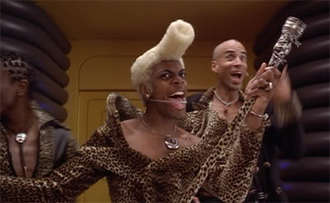Cowardice is all too common within me, so know that when I write of cowardice, it is not as a judge of men, but as man’s flawed ally against it. I want to be clear about that, before I write this:
Damon Knight was a coward, when he could have been a Grandmaster.
Setting aside the fact that there is a Grandmaster award named after him, and that he has been acknowledged by a number of governing bodies as a Grandmaster, I would merely mention that a true Grandmaster is never established by bureaucracy. He is established by his books.

Great Cowards of Science Fiction
And it was books, or, rather certain books, that inspired Damon Knight to spiral into a season of contradictory opinion, an intellectual lapse that could only have been the result of brain damage or cowardice. Unless he was suffering from an undisclosed bout of acute porphyrias at the time, I am inclined to favor cowardice.
You see, Knight had been a fan of science fiction – the pulps – since childhood, and reading space opera inspired his career in science fiction short stories and television adaptations. I’m pretty sure that one of the very first episodes of the Twilight Zone that I saw (in reruns on a UHF channel – look it up kids!) was Knight’s most broadly recognized work: “To Serve Man.” It is a very intimate first contact story. Unfortunately for readers, the television adaptation happens to be superior to the original story.
As a critic and a fan, Knight had a lifelong ambition to do a historical review of the space magazines and novels of his childhood, both to revisit the joys of youth and to place the significance of those tales into a 20th century literary context.
At some point, his passions changed. He marked the reversal publicly with his cutting personal essay titled in clear Gravesian fashion: “Goodbye, Henry J. Kostkos, Goodbye.” The article was published in the progressive New Wave collection of “speculative fiction” stories and criticism Clarion II. *
So, Knight had a change of heart. He went from being a fan and advocate of the “old” science fiction rockets and space travel and adventure and aliens, to becoming one of its most prominent critics. Big deal. Plenty of authors changed course in their careers: H. Beam Piper stopped writing near-future fiction because he kept guessing wrong. Forgotten Master Jefferson Sutton tried his hand (like most authors did in the early 70s) at New Wave style. People change.
That’s not the cowardice. The act of cowardice was what he did next, a few short years after his now famous disintegration of “old” (i.e. “Blue”) Science Fiction…
…He quietly asked for a mulligan.

I’m Burke. Carter Burke. I work for the company. But don’t let that fool you, I’m really an okay guy.
According to the yeoman of adventure fiction custodianship, John O’Neill, Knight reversed field – completely – again, about four years later, writing:
In compiling this volume I have partially fulfilled an old ambition, one which I thought I had given up years ago — to reread all the old science fiction magazines I loved when I was young and write their critical history. I wrote about this in in essay called “Goodbye, Henry J. Kostkos, Goodbye” (Clarion II, edited by Robin Scott Wilson), where I said the project was no longer possible because there was no audience for the old stories, and, in addition, because they were all junk. This was sour grapes. In fact, as you will see, many of the forgotten stories of the thirties are neglected gems.
In other words, once Knight discovered there was a paying market for those beloved “neglected gems” they ceased being “all junk.”
This act of cowardice–minor, to be sure, in the grand scheme–is nevertheless not insignifcant. Forty years on, many are aware of Knight’s scorched-earth “Goodbye” to Blue Science Fiction. No one (except the intrepid O’Neill) has ever mentioned his retraction. I believe that this ability for Knight to adapt may have brought him much success and reputation.
I believe it may have cost him a magnum opus, as well.
After all, if foolish consistency is the thing of little minds, how much worse is a foolish inconsistency?
I conceive of an alternate universe where Knight, instead of giving up on his lifelong quest to revisit the stars – due to his (false) perception of market forces and his pandering to the popular “progressive” new wave of Pink SF – the author embraced his childish inspiration. Instead of falling to earth as a forefather of Mundane Science Fiction, and accepting the political acknowledgement of other earthbound groundlings as a type of grandmaster – I believe that Alternate Knight might have achieved more than mere mastery: he would have gone back–and gone back fully–to his history of pulps in space, and, instead of arriving late to serve as a minor conservator of the genre, he might have explored new worlds, instead of – as most of his work indicates – treading the same temporal themes over and over again.
Instead, the real Knight took one last look at the stars with his dutiful if small-scale nostalgic compilation of the history of 1930s science fiction, and never returned to the subject again. It is notable that the few remaining original novels and stories following his crisis of criticism were–to a tale–earthbound social stories. Whether or not he could have more completely withdrawn the betrayal of the genre, I do not know. What is clear is that, aside from a forward in a specialty anthology, he had a quarter century to attempt to drive a stake into his “Goodbye,” and never succeeded. To this day, his “Goodbye” is still widely acknowledged as his final word on the matter.
Can you imagine if Robert Graves had written a sequel titled, No, Wait! I Meant Hello! ?
On the other hand, I don’t think it is wise to trust the judgment of any critic such as Knight who wrote this of A.E. Van Vogt:
“[He] is not a giant as often maintained. He’s only a pygmy who has learned to operate an overgrown typewriter.”
*Note the cover of Clarion II. It uses that time honored rockets and robots science fiction trope of a nude woman asleep in an earthly forest. Oh, and she’s pink!

What you screamin’ for? Every 5 minutes there’s somethin’, a bomb or somethin’. I’m leavin’!
In addition to being a mediocre writer, Knight was really a two-faced piece of work. He rather reminds me of a more recent three-time SFWA president.
“ARE YOU A COWARD? Well, yes, certainly. If possible. If allowed a free choice.” –Glory Road